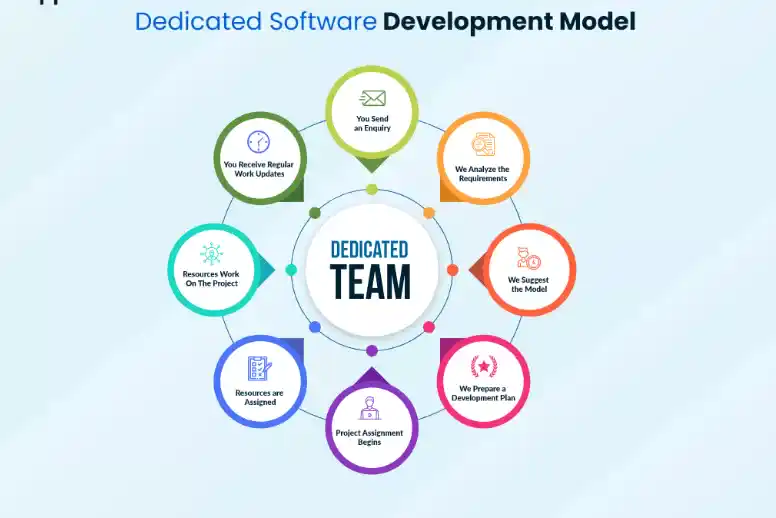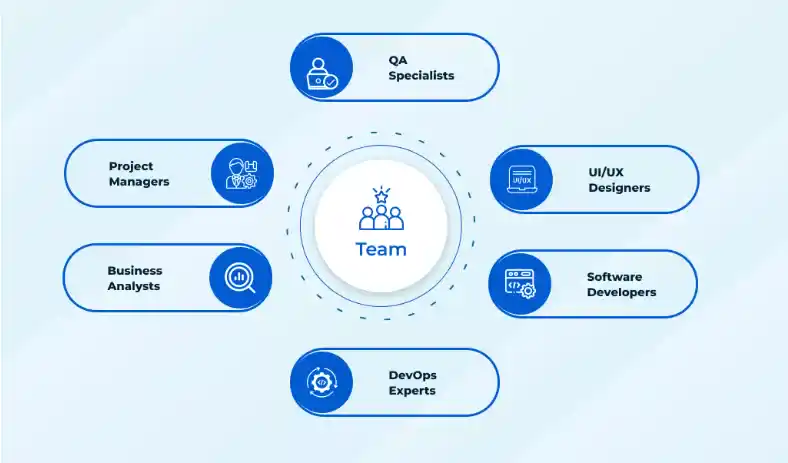Table of Contents
In today’s fast-paced business landscape, organizations are increasingly turning to dedicated development team to drive their projects to success. A dedicated development team represents a strategic partnership between a client and a service provider, offering a tailored approach to software development that yields numerous benefits.
What is a Dedicated Development Team?
- A Dedicated Development Team embodies a long-term partnership between a client and a service provider in software development. This outsourcing model entails developers collaborating with startups to achieve predetermined objectives, making it an optimal choice for both established companies and growing startups.
- In essence, the term “Dedicated” underscores the tailored approach of this model—team members are carefully selected to meet the unique requirements of each project.
- When opting for a dedicated team, clients benefit from professionals tailored to their business goals, akin to an in-house team without the administrative burden.
- Unlike in-house employees, clients are relieved of responsibilities regarding administration, HR, taxation, and social benefits, allowing them to focus on core priorities while the development partner handles the operational aspects.
7 Powerful Benefits To Supercharge Your Projects
From enhanced flexibility to accelerated project timelines, these teams bring a wealth of advantages to the table. In this article, we’ll explore 7 powerful benefits that dedicated development teams offer, and how they can supercharge your projects for optimal results.
1. Unparalleled Expertise
Opting for a dedicated development team means tapping into a deep well of expertise. These professionals boast cutting-edge knowledge of the latest technologies, frameworks, and industry standards. Their specialized skills ensure that your project doesn’t just function but stands as a beacon of innovation.

2. Expedited Time-to-Market:
In the fast-paced business landscape, time is of the essence. A dedicated development team operates in seamless harmony, streamlining the development process for swift progress. This cohesion translates to accelerated development cycles, significantly reducing your time-to-market. Rapid deployment can be a game-changer, particularly in fiercely competitive industries.
3. Cost-Effectiveness
Contrary to common misconceptions, hiring a dedicated development team can offer significant cost savings compared to traditional in-house teams. By bypassing infrastructure costs, employee benefits, and training expenses, you achieve financial efficiency. This newfound flexibility allows you to allocate resources where they yield the most impact.
4. Ongoing Support and Maintenance
The journey doesn’t conclude with project delivery. A dedicated development team provides continuous support and maintenance, ensuring your software remains up-to-date, optimized, and adaptable to evolving business needs and market trends.
5. Assurance of Quality
Quality reigns supreme in software development. Dedicated teams adhere to stringent testing protocols to ensure your software not only meets but surpasses industry standards. This unwavering commitment to quality guarantees a seamless user experience and minimizes the risk of post-deployment issues.
6. Streamlined Communication
Clear and transparent communication is the cornerstone of project success. Dedicated development teams excel in fostering seamless communication channels. Whether through regular updates, progress reports, or collaborative tools, you remain informed and engaged, ensuring alignment between your vision and the project’s trajectory. A client success manager plays a pivotal role in facilitating seamless communication between the client and the development team, ensuring that project objectives are clearly understood and met.
7. Effective Risk Management
Every project entails inherent risks. With a dedicated development team, risks are mitigated through distributed expertise. These professionals possess adept risk assessment skills and employ proactive mitigation strategies to identify and address potential roadblocks before they escalate.

What is a Dedicated Development Team Structure?
A Dedicated Development Team (DDT) represents a collaborative structure where project requirements are delegated to remote developers. This team composition is tailored to meet your project’s technical needs, typically comprising key professionals such as Product Managers, Project Managers, Business Analysts, UI/UX Designers, Technical Leads, Backend and Frontend Developers, Quality Analysts, and Mobile Developers.

- Product Manager: Aligns audience needs with business objectives, managing feature integration and launch.
- Project Manager: Ensures team synchronization in project development, adhering to time, budget, and delivery plans while meeting client expectations.
- Business Analyst: Creates requirements for future solutions.
- UI/UX Designer: Collects, researches, and evaluates technical requirements to shape user experience and interface design.
- Technical Lead: Guides backend, frontend, and mobile development teams.
- Backend and Frontend Developers: Develop and maintain server-side interactions and integrate UX/UI design respectively.
- Quality Analyst: Checks app performance and suggests workflow enhancements across code, logic, and UI design.
- Mobile Developer: Shares frontend development responsibilities, focusing on mobile applications.
Conclusion
Partnering with a dedicated development team offers a myriad of benefits that can propel your project to success. From harnessing unparalleled expertise and accelerating time-to-market to ensuring cost-effectiveness and ongoing support, the advantages are abundant.
With a focus on quality assurance, streamlined communication, and effective risk management, dedicated teams provide the foundation for seamless project execution and long-term success. Embracing this collaborative approach not only enhances project outcomes but also positions your business for sustained growth and innovation in today’s competitive landscape.